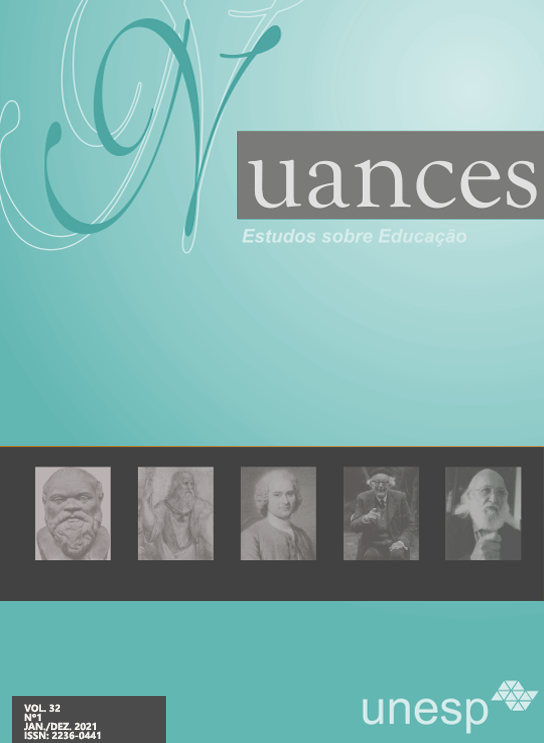Esthetic and didactic considerations for literature teaching: an historical-dialetic materlistic apropriation of João Cabral de Melo Neto
DOI:
https://doi.org/10.32930/nuances.v32i00.8463Keywords:
Literature teaching, João Cabral, Historical-critical pedagogy, Activity theory, Esthetic reflection, Learning to learnAbstract
Is the poetry of João Cabral de Melo Neto with its place assured in the current educational programs about literature teaching? Departing since a radical criticism about the state of art in pedagogics, it is considered that no. The current tendency today tends to discard it along with other precious literary productions, within a larger process of emptying of scholar contents. Why the valorization of poetry requires a substantive, historical and critical pedagogy theory? And why is João Cabral’s poetry relevant for an emancipating and critical education perspective? In other words, this paper underlines the importance of Historical-critical Pedagogy for educators and scholars of João Cabral, by one way; and the importance of João Cabral for educators that assume such the PHC as other critical perspectives in education, by another way. To solve this problem, the paper analyses the poem “The River”, and discuss the “esthetic reflection theory”, by György Lukács, as well the Activity Theory, by A. Leontiev, considered opportune for the problem of the directive or non-directive way of the educational work and its needs. These are existing questions in the pith of the current pedagogic problematics.
Downloads
References
BRASIL. Parâmetros curriculares nacionais: história. Secretaria de Educação. Ensino Fundamental. Brasília, DF: MEC/ SEF, 1998.
BRASIL. Base Nacional Comum Curricular (BNCC). Educação é a Base. Brasília, DF: MEC/CONSED/UNDIME, 2018.
BRASIL Ministério da Educação. Secretaria de Educação Básica. Fundo Nacional de Desenvolvimento da Educação. Guia Digital PNLD 2020 Literário. Brasília, DF: MEC/SEB/FNDE, 2020. Disponível em: https://www.fnde.gov.br/index.php/centrais-de-conteudos/publicacoes/category/124-livro-didatico?download=14090:att150920. Acesso em: 10 jan. 2021.
CANDIDO, A. O direito à literatura. In: CANDIDO, A. Vários Escritos. Rio de Janeiro: Ouro Sobre Azul, 2011. p. 171-193.
DUARTE, N. A catarse na didática da pedagogia histórico-crítica. Pro-posições, Campinas, v. 30, e20170035, 2019.
DUARTE, N. A rendição pós-moderna à individualidade alienada e a perspectiva marxista da individualidade livre e universal. In: DUARTE, N. (org.). Crítica ao fetichismo da individualidade. Campinas, SP: Autores Associados, 2004. p. 219-242.
DUARTE, N. As pedagogias do “aprender a aprender” e algumas ilusões da assim chamada sociedade do conhecimento. Revista Brasileira de Educação, 2001, n. 18.
LEONTIEV, A. N. El problema de la actividad en psicología (cap. III). In: LEONTIEV, A. N. Actividad, conciencia y personalidad. México: Cartago, 1984. p. 60-97.
LEONTIEV, A. N. As necessidades e os motivos da atividade. In: LONGAREZI, A. M.; PUÉNTES, R. V. (org.) Ensino desenvolvimental: antologia. Uberlândia, MG: EDUFU, 2017.
LUKÁCS, G. Introdução aos escritos estéticos de Marx e Engels. In: LUKÁCS, G. Ensaios sobre literatura. Rio de Janeiro: Civilização Brasileira, 1965a.
LUKÁCS, G. Narrar ou descrever? In: LUKÁCS, G. Ensaios sobre literatura. Rio de Janeiro: Civilização Brasileira, 1965b.
LUKÁCS, G. Introdução a uma estética Marxista: Sobre a Particularidade como Categoria da Estética / Georg Lukács. São Paulo: Instituto Lukács, 2018.
MÁRKUS, G. O conceito de “essência humana” na filosofia de Marx. São Paulo: Expressão Popular, 2015. 144 p.
MARINI, R. M. Dialética da Dependência. In: TRASPADINI, R.; STEDILLE, J. P. Ruy Mauro Marini: vida e obra. São Paulo: Expressão Popular, 2015. p. 137-179.
MARTINS, L. M.; LAVOURA, T. N. Materialismo histórico-dialético: contributos para a investigação em educação. Educ. rev., Curitiba, v. 34, n. 71, p. 223-239, 10 out. 2018.
MARX, K. O capital: crítica da economia política. Livro III: O processo global da produção capitalista (1894). Trad. Rubens Enderle. São Paulo, Boitempo, 2017.
MELO NETO, J. C. O Rio ou relação da viagem que faz o Capibaribe de sua nascente à cidade do Recife. In: MELO NETO, J. C. Morte e vida severina e outros poemas. Rio de Janeiro: Objetiva, 2007. p. 15-49.
NETTO, J. P. Introdução ao estudo do método de Marx. São Paulo: Expressão Popular, 2011.
SÃO PAULO (Estado). Secretaria da Educação. Currículo do Estado de São Paulo: Linguagens e suas tecnologias. 1. ed. atual. São Paulo: SE, 2011.
SÃO PAULO (Estado). Secretaria da Educação. Currículo Paulista. São Paulo, 2019. v. 1. Disponível em: https://efape.educacao.sp.gov.br/curriculopaulista/wp-content/uploads/sites/7/2019/09/curriculo-paulista-26-07.pdf. Acesso em jan. 2021.
SAVIANI, D. Escola e Democracia. Campinas, SP: Autores Associados, 2008. 112 p.
SAVIANI, D. Pedagogia histórico-crítica: primeiras aproximações. Campinas, SP: Autores Associados, 2005.
Published
How to Cite
Issue
Section
License
Atribuição-NãoComercial
CC BY-NC
Esta licença permite que outros remixem, adaptem e criem a partir do seu trabalho para fins não comerciais, e embora os novos trabalhos tenham de lhe atribuir o devido crédito e não possam ser usados para fins comerciais, os usuários não têm de licenciar esses trabalhos derivados sob os mesmos termos.





